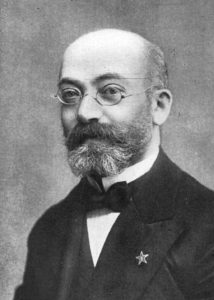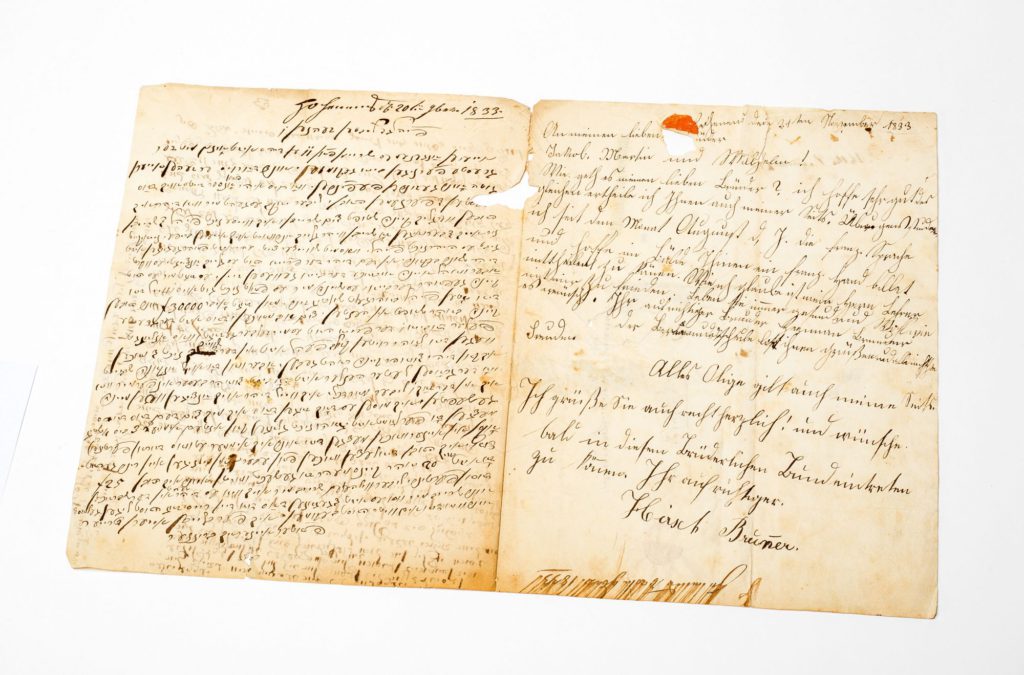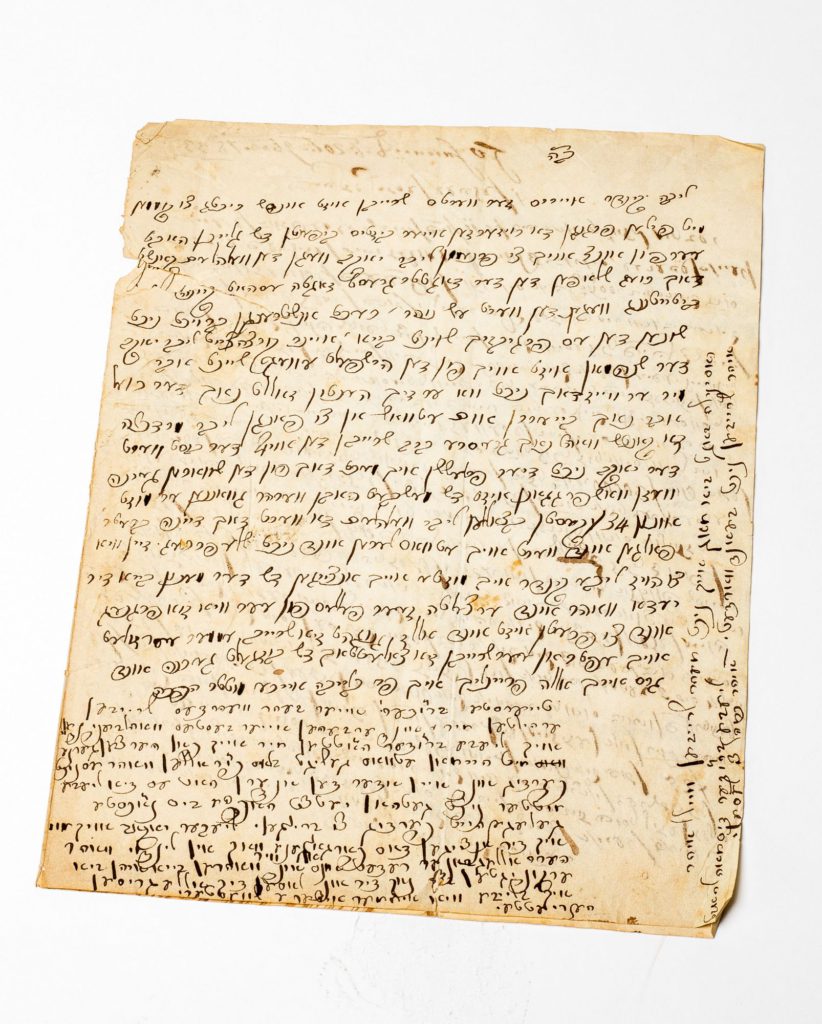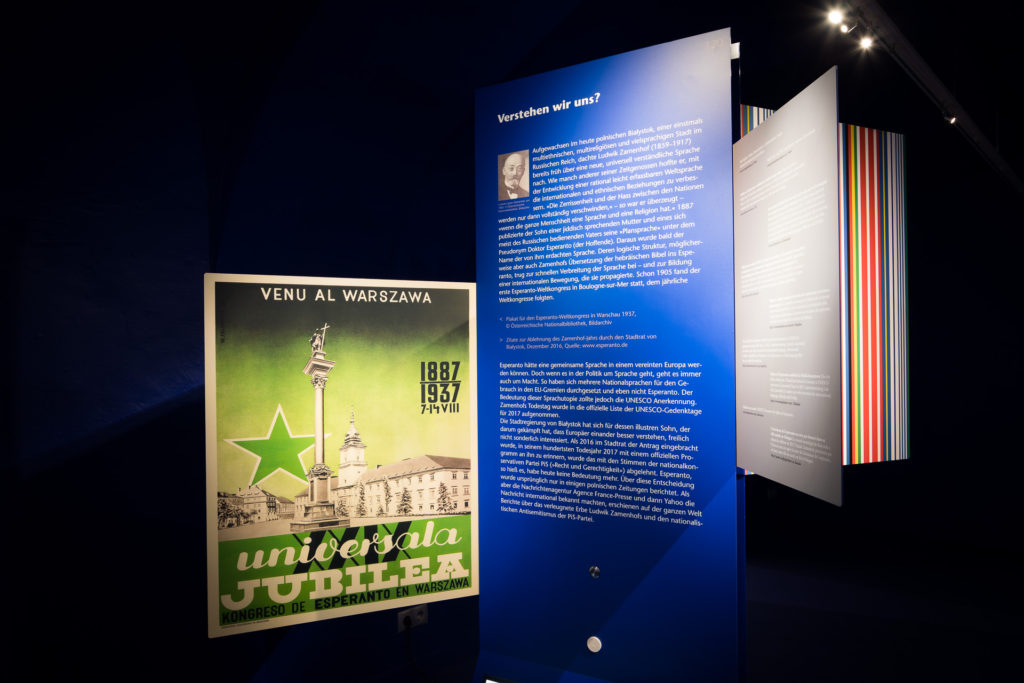3 lenticular transparent prints
Berlin 2022
An Installation for the Jewish Museum Munich.
With texts in German, English and Esperanto by: Agnes Heller, Ludwik Zamenhof, Bernard-Henri Lévy, André Glucksman, Daniel Cohn-Bendit and Jaques Derrida / Jürgen Habermas
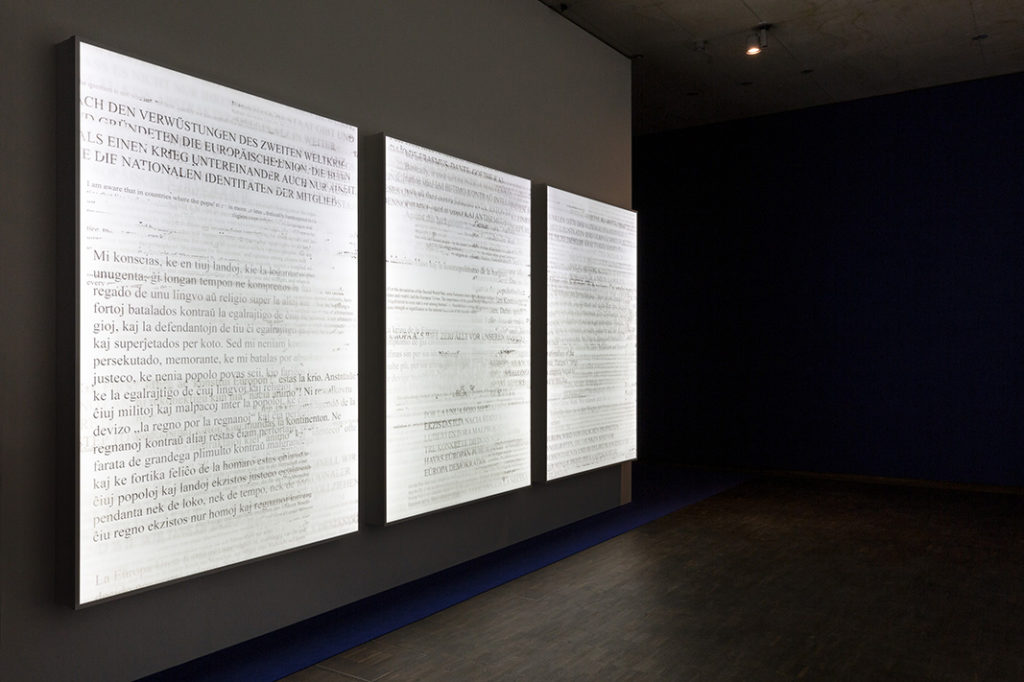
Arnold Dreyblatt: Last Europeans?
Photo: Eva Jünger
We are still in a phase of overcoming the nation state. Basically, it took us five hundred years to conquer the nation state and the cultural identities that emerged with it, with all their contradictions—revolutions, terrible historical moments—and to transform them into something new. Against this background Europe is a unique project.The question is not whether, but how quickly we accomplish the necessary transfer of national sovereignty to the European level. And how we shape this democratically.For the first time many people are realizing that there is not only their nation state and that the EU is not an abstract playground in the far distance. People are realizing that Europe has a very concrete impact on our everyday life. For the first time we have a European public. This is a decisive step towards a European democracy.
André Glucksmann
The crisis of the European Union is a symptom of its civilization. It doesn’t define itself based on its identity but, rather, on its otherness. A civilization isn’t necessarily based on a common desire to achieve the best but, rather, on excluding and making the evil taboo. In historical terms, the European Union is a defensive reaction to horror.
Jacques Derrida / Jürgen Habermas
Today we know that many political traditions, which in the semblance of their naturalness demand authority, have been “invented.” In contrast, a European identity born in the light of the public would have from the beginning a feeling of something constructed. But only something constructed arbitrarily would bear the stigma of arbitrariness. The political-ethical will, which is expressed in the hermeneutics of self-understanding processes, is not arbitrariness. The distinction between the heritage we take on and the one we want to reject requires as much circumspection as the decision on the reading in which we appropriate it. Historical experiences are candidates only for a conscious appropriation, without which they do not acquire an identity-forming force.
Today’s Europe is scarred by the experiences of the totalitarian regimes of the twentieth century and by the Holocaust—the persecution and extermination of European Jews, in which the Nazi regime also implicated the societies of the conquered countries. The self-critical debates about this past have brought to mind the moral foundation of politics. A heightened sensitivity to violations of personal and bodily integrity is reflected, among other things, in the fact that the council of Europe and the EU have made renunciation of the death penalty a condition of membership.
Jacques Derrida and Jürgen Habermas, “Nach dem Krieg: Die Wiedergeburt Europas”, FAZ, Mai 31, 2003 (excerpts)
I call patriotism or service to the fatherland only service to the welfare of all my compatriots, regardless of their origin, language or religion. I must never call patriotism the service to particularly the non-Jewish interests, language or religion of that population which constitutes the majority in the country. In accordance with the principle that citizens—even if they constitute a larger majority in the country—have no moral right to impose their language or religion on other citizens, I must advocate that in my country every people has the right to establish schools and other institutions for their members with their language and their religion if they so desire, but that in all public institutions, which are not exclusively for one people, only a neutral human language and neutral human or state stability should prevail. As long as this is not possible, I must work to ensure that there are schools and other institutions in my country with a neutral human language for those subjects who do not want or cannot use institutions with this or that vernacular; and from all mutual struggles of tongues or religions for supremacy I must abstain, for it is only a struggle between one wrong and another.
I am aware that in countries where the population is more or less ethnically homogenous the injustice that lies in the domination of one language or religion over others will not be understood for a long time, and the population will fight with all means against equal rights for all languages and religions and will persecute and sling mud at those who advocate equal rights. But I will never let myself be confused by this persecution and remember that I am fighting for absolute truth and justice, that no people can know what will happen to them tomorrow, that equal rights for all languages and religions will eliminate the cause of all wars and conflicts between peoples, that any action against the principle of “the empire for the citizens” and violence among citizens will always remain violence, even if committed by an overwhelming majority against a marginal minority, and that lasting happiness for mankind is only possible on the condition of equal and absolute justice for all people and countries, regardless of place and time and strength, and when in every empire there will be only human beings, only citizens regardless of their ethnicity.
I call my nation the totality of all people who live in my homeland, regardless of their origin, language or religion. But to my nationality I must always add the words “human being” to show that I do not count myself among my nation in a chauvinistic sense. The multitude of all people who have the same origin as me I call my people. I must not call my nation by the name of any people, I have always to call it—at least in conversation with like-minded people—by the neutral geographical name of my empire or country. If my interlocutor wants to know not only which political-geographical, but also which ethnic group I belong to, then I name to him my people, my language, my religion etc. separately. Example: Swiss individual, Petersburg individual, Warsaw individual.
Ludwik Zamenhof, Hillelismus, 1901
Ágnes Heller
Nationalism’s victory came in 1914—against the internationalism of the working class and the cosmopolitanism of the bourgeoisie. Europe’s “original sin” was the ugly child of nationalism. All previous empires began to break up into nation states. This trend is being continued to this day.
The exclusionary character of nation states is best illustrated by the history of European Jews in the 19th and 20th centuries and the history of the two world wars. Modern antisemitism (as opposed to earlier anti-Judaism) is a product of nation states. The shift from nationalism to racism was no accident, as the aspect of racism is inherent to ethnic nationalism.
After the devastation of the Second World War, some European states drew the consequences from the dark side of being nation states and established the European Union. The importance of this grand design should not be downplayed. Member states are obliged never to even start a war among themselves. Nonetheless, a sense of European identity has not, to this day, gained the same strength or significance as the national identities of the member states.
The European Union was founded on the decision to uphold certain values. However, even among those values chosen there are contradictions. First and foremost, because the Union is a union of nation states. As a Union, the value of solidarity must prevail; as a Union of nation states, on the other hand, it has to respect national interests due to a nation’s values, so nationalism will usually be stronger than solidarity.
Ágnes Heller, Paradox Europa, Wien 2019
“Libération” / Bernard-Henri Lévy
“Enough of ‘building Europe’!” is the cry. Let’s reconnect instead with our “national soul”! Let’s rediscover our “lost identity”! This is the agenda shared by the populist forces washing over the continent. Never mind that abstractions such as “soul” and “identity” often exist only in the imagination of demagogues.
Europe is being attacked by false prophets who are drunk on resentment, and delirious at their opportunity to seize the limelight.
Europe as an idea is falling apart before our eyes.
For those who still believe in the legacy of Erasmus, Dante, Goethe and Comenius there will be only ignominious defeat. A politics of disdain for intelligence and culture will have triumphed. There will be explosions of xenophobia and antisemitism. Disaster will have befallen us.
Our faith is in the great idea that we inherited, which we believe to have been the one force powerful enough to lift Europe’s peoples above themselves and their warring past. We believe it remains the one force today virtuous enough to ward off the new signs of totalitarianism that drag in their wake the old miseries of the dark ages. What is at stake forbids us from giving up. Our generation got it wrong. Like Garibaldi’s followers in the 19th century, who repeated, like a mantra, “Italia se farà da sè” (Italy will make herself by herself), we believed that the continent would come together on its own, without our needing to fight for it, or to work for it. This, we told ourselves, was “the direction of history”. We must make a clean break with that old conviction. We don’t have a choice. We must now fight for the idea of Europe or see it perish beneath the waves of populism.
Copyright: “Libération” / Bernard-Henri Lévy (signed by: Milan Kundera, Salman Rushdie, Elfriede Jelinek et. al., 25.01.2019)
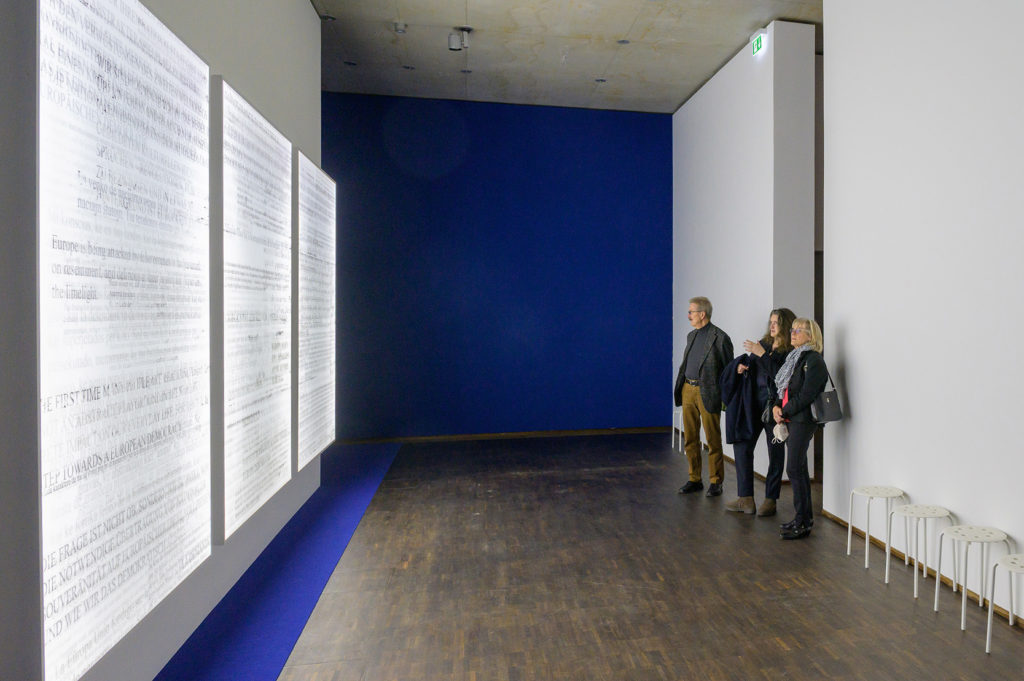
Photo: Daniel Schvarcz
Esperanto:
Daniel Cohn-Bendit
Ni daŭre estas en fazo de lukto por superi la nacian ŝtaton. Fakte ni bezonis kvincent jarojn por venki la nacian ŝtaton kaj la kune kun ĝi disvolviĝintajn kulturajn identecojn kun ĉiuj ties kontraŭdiroj – revolucioj, teruraj historiaj momentoj – kaj transformi ilin en ion novan. Antaŭ tiu fono Eŭropo estas unika projekto.
La demando ne estas ĉu, sed kiom rapide ni efektivigos la necesan transiron de nacia suvereneco sur la Eŭropan nivelon. Kaj kiel ni aranĝu tion demokratie.
Por la unua fojo multaj homoj konsciiĝas, ke ne nur ekzistas ilia nacia ŝtato kaj la EU ne estas abstrakta ludejo en fora malproksimeco. Oni rimarkas, ke Eŭropo tre konkrete difinas nian ĉiutagan vivon. Unuafoje ni havas eŭropan publikecon. Tio estas decida paŝo al eŭropa demokratio.
André Glucksmann
La krizo de la Eŭropa Unio estas simptomo de ĝia civilizacio. Ĝi ne difinas sin per sia identeco, sed, multe pli, per sia alieco. Civilizacio ne devige baziĝas sur komuna deziro akiri la plej bonan, sed, multe pli, sur la volo ekskludi kaj tabui la malbonon. En historiaj terminoj, la Eŭropa Unio estas defenda reago al hororo.
Jacques Derrida / Jürgen Habermas
Hodiaŭ ni scias, ke multaj politikaj tradicioj, kiuj en sia ŝajno de natura deveno postulas aŭtoritaton, estas „inventitaj“. Male eŭropa identeco, naskita antaŭ ĉies okuloj, dekomence surhavus ion konstruitan. Sed nur io arbitre konstruita portus la makulon de ajneco. La politik-etika volo, kiu montras sin en la hermeneŭtiko de procezoj de memkomprenigo, ne estas arbitro. La diferencigo inter la heredaĵo, kiun ni akceptas, kaj tiu, kiun ni volas refuti, postulas samkvantan diligenton kiel la decido pri la interpretado, per kiu ni alpropriigas ĝin. Historiaj spertoj kandidatas nur por konscia alpropriigo, sen kiu ili ne atingas identec-formigan forton.
La nuntempan Eŭropon karakterizas la spertoj de la totalismaj reĝimoj de la dudeka jarcento kaj de la Holokaŭsto – la persekutado kaj pereigo de la eŭropaj judoj, en kiun la NS-reĝimo implikis ankaŭ la societojn de la konkeritaj ŝtatoj. La memkritikaj konfrontiĝoj al tiu pasinto rememorigis la moralajn fundamentojn de politiko. Kreskinta sentemo pri lezoj de persona kaj korpa integrecoj inter alie speguliĝas en tio, ke Eŭropa Konsilo kaj EU rangigis la rezignon pri mortopuno je membriga kondiĉo.
Ludwik Zamenhof
Patriotismo aŭ servo al la patrujo mi nomas nur la servadon al la bono de ĉiuj miaj samregnanoj, de kia ajn deveno, lingvo aŭ religio ili estas; la servadon speciale al la gentaj interesoj, lingvo aŭ religio de tiu loĝantaro, kiu en la lando prezentas la plimulton, mi neniam devas nomi patriotismo. Konforme al la principo, ke unuj regnanoj, eĉ se ili prezentas en la lando grandegan plimulton, ne havas moralan rajton altrudi sian lingvon aŭ religion al aliaj regnanoj, mi devas penadi, ke en mia lando ĉiu gento havu la rajton fondi por siaj membroj lernejojn kaj aliajn instituciojn kun sia lingvo kaj sia religio, se ili tion ĉi deziras, sed ke en ĉiuj publikaj institucioj, ne destinitaj sole por unu gento, regu nur lingvo neŭtrale-homa kaj festoj neŭtrale-homaj aŭ regnaj. Tiel longe, kiel la atingo de tio ĉi estos ne ebla, mi devas penadi, ke en mia lando ekzistu lernejoj kaj aliaj institucioj kun lingvo neŭtrale-homa por tiuj regnanoj, kiuj ne volas aŭ ne povas uzi instituciojn kun tiu aŭ alia genta lingvo, kaj de ĉia reciproka batalado de lingvoj aŭ religioj pro regado mi devas teni min flanke, ĉar ĝi estas nur batalado inter unu maljustaĵo kaj alia.
Mi konscias, ke en tiuj landoj, kie la loĝantaro estas pli-malpli unugenta, ĝi longan tempon ne komprenos la maljustecon de regado de unu lingvo aŭ religio super la aliaj kaj ĝi per ĉiuj fortoj batalados kontraŭ la egalrajtigo de ĉiuj lingvoj kaj religioj, kaj la defendantojn de tiu ĉi egalrajtigo ĝi persekutados kaj superĵetados per koto. Sed mi neniam konfuziĝos per tiu ĉi persekutado, memorante, ke mi batalas por absoluta vero kaj justeco, ke nenia popolo povas scii, kio fariĝos kun ĝi morgaŭ, ke la egalrajtigo de ĉiuj lingvoj kaj religioj forigos la kaŭzon de ĉiuj militoj kaj malpacoj inter la popoloj, ke ĉia ago kontraŭ la devizo „la regno por la regnanoj“ kaj ĉia perfortaĵo de unuj regnanoj kontraŭ aliaj restas ĉiam perfortaĵo, eĉ se ĝi estas farata de grandega plimulto kontraŭ malgrandega malplimulto, kaj ke fortika feliĉo de la homaro estas ebla nur tiam, kiam por ĉiuj popoloj kaj landoj ekzistos justeco egala kaj absoluta, dependanta nek de loko, nek de tempo, nek de forto, kaj kiam en ĉiu regno ekzistos nur homoj kaj regnanoj kaj ne gentoj.
Mia nacio mi nomas la tutecon de ĉiuj homoj, kiuj loĝas mian patrujon, de kia ajn deveno, lingvo aŭ religio ili estas; sed al mia nacia nomo mi devas ĉiam aldoni la vorton „Homarano“, por montri, ke mi alkalkulas min al mia nacio ne en senco ŝovinista. La aron de ĉiuj honoj, kiu havas saman devenon kiel mi, mi nomas mia gento. Mian nacion mi ne devas nomi per la nomo de ia gento, mi devas ĉiam nomi ĝin – almenaŭ en parolado kun homaranoj – per la neŭtrale-geografia nomo de mia regno aŭ lando. Se mia interparolanto deziras scii ne sole al kiu politike-geografia, sed ankaŭ al kiu etnografia grupo mi apartenas, tiam mi aparte nomas al li mian genton, lingvon, religion k.t.p. Ekzemploj: Sviso-Homarano, Peterburgia Homarano, Varsovilanda Homarano.
„Libération” / Bernard-Henri Lévy
„Sufiĉe de ‘konstrui Eŭropon’!“ estas la krio. Anstataŭe ni rekonektiĝu kun nia „nacia animo“! Ni remalkovru nian „perditan identecon“! Jen la komuna agendo de la popolismaj fortoj, kiuj inundas la kontinenton. Ne gravas, ke abstraktaĵoj kiel „animo“ kaj „identeco“ ofte ekzistas nur en la imago de demagogoj.
Eŭropo estas atakata de falsaj profetoj, kiuj estas ebriaj pro rankoro, kaj deliras pro sia ŝanco okupi la spotlumon.
Eŭropo kiel ideo disfalas antaŭ niaj okuloj.
Por tiuj, kiuj ankoraŭ kredas je la heredaĵo de Erasmus, Dante, Goethe kaj Komenio, estos nur hontiga malvenko. Politiko de malestimo kontraŭ intelekto kaj kulturo estos triumfinta. Estos eksplodoj de ksenofobio kaj antisemitismo. Katastrofo estos trafinta nin.
Nia fido estas en la grandioza ideo, kiun ni heredis, kiun ni kredas la sola forto sufiĉe potenca por levi la popolojn de Eŭropo super ili mem kaj super ilia militema pasinteco. Ni kredas, ke ĝi restas la sola forto aktuale sufiĉe virta por kontraŭstari al la novaj signoj de totalismo, kiuj kuntrenas en sia kil-ondo la malnovajn mizerojn de la mallumaj epokoj. Tio, kion ni riskas, malpermesas al ni rezigni. Nia generacio eraris. Kiel la adeptoj de Garibaldi en la 19-a jarcento, kiuj mantre ripetis „Italia se farà da sè” (Italio faros sin mem), ni kredis, ke la kontinento kuniĝos memstare, sen nia bezono batali por ĝi, aŭ labori por ĝi. Jen, ni diris al ni mem, „la direkto de la historio“. Ni devas fari klaran rompon kun tiu malnova konvinko. Ni ne havas alternativon. Ni devas nun batali por la ideo de Eŭropo aŭ vidi ĝin perei sub la ondoj de popolismo.

